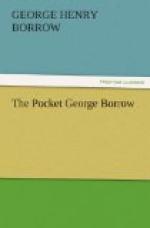A sound was heard like the rapid galloping of a horse, not loud and distinct as on a road, but dull and heavy as if upon a grass sward, nearer and nearer it came, and the man, starting up, rushed out of the tent, and looked around anxiously. I arose from the stool upon which I had been seated, and just at that moment, amidst a crashing of boughs and sticks, a man on horseback bounded over the hedge into the lane at a few yards’ distance from where we were; from the impetus of the leap the horse was nearly down on his knees; the rider, however, by dint of vigorous handling of the reins, prevented him from falling, and then rode up to the tent. ‘’Tis Nat,’ said the man; ‘what brings him here?’ The new comer was a stout, burly fellow, about the middle age; he had a savage, determined look, and his face was nearly covered over with carbuncles; he wore a broad slouching hat, and was dressed in a grey coat, cut in a fashion which I afterwards learnt to be the genuine Newmarket cut, the skirts being exceedingly short; his waistcoat was of red plush, and he wore broad corduroy breeches and white top-boots. The steed which carried him was of iron grey, spirited and powerful, but covered with sweat and foam. The fellow glanced fiercely and suspiciously around, and said something to the man of the tent in a harsh and rapid voice. A short and hurried conversation ensued in the strange tongue. I could not take my eyes off this new comer. Oh, that half-jockey half-bruiser countenance, I never forgot it! More than fifteen years afterwards I found myself amidst a crowd before Newgate; a gallows was erected, and beneath it stood a criminal, a notorious malefactor. I recognised him at once; the horseman of the lane is now beneath the fatal tree, but nothing altered; still the same man; jerking his head to the right and left with the same fierce under-glance, just as if the affairs of this world had the same kind of interest to the last; grey coat of Newmarket cut, plush waistcoat, corduroys, and boots, nothing altered; but the head, alas! is bare and so is the neck. Oh, crime and virtue, virtue and crime!—it was old John Newton I think, who, when he saw a man going to be hanged, said: ’There goes John Newton, but for the grace of God!’
* * * * *
After much feasting, drinking, and yelling, in the Gypsy house, the bridal train sallied forth—a frantic spectacle. First of all marched a villainous jockey-looking fellow, holding in his hands, uplifted, a long pole, at the top of which fluttered in the morning air a snow-white cambric handkerchief, emblem of the bride’s purity. Then came the betrothed pair, followed by their nearest friends; then a rabble rout of Gypsies, screaming and shouting, and discharging guns and pistols, till all around rang with the din, and the village dogs barked. On arriving at the church gate, the fellow who bore the pole stuck it into the ground with a loud huzza, and the train, forming two ranks, defiled into the church on either side of the pole and its strange ornaments. On the conclusion of the ceremony, they returned in the same manner in which they had come.




